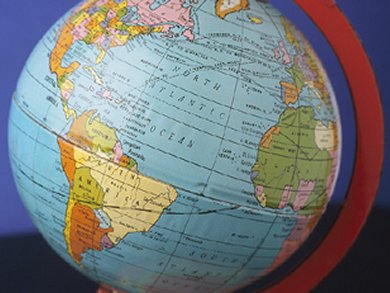Science: A Global Endeavor
Science is truly a global endeavor. Over 35 % of articles now published in international journals are internationally collaborative [1]. Although collaborations that span continents are now commonplace, the education of most doctoral students continues to occur within the boundaries of a single institution. This practice neglects the development of a crucial ability in practicing modern science, namely, cross-cultural communication and understanding. The inclusion of international experience in graduate education allows the exchange of knowledge, skills, and culture.
This exchange is beneficial not only for the student, but also for the research advisor, and the scientific community as a whole. While international study involves costs, both in terms of time and money, the cost of ignoring such opportunities is far greater. In our globalized field, such experience is indispensible.
Why Wait? International Experience in Graduate Education
Recently, I returned from Kyoto, Japan, where I worked in the chemistry department of Kyoto University as part of a research fellowship sponsored by the Japan Society for the Promotion of Science (JSPS) and the U.S. National Science Foundation [2]. This was my first excursion outside of the United States.
Before leaving the country, I never thought of my education as being culturally insular.  I have friends from a number of different countries, and they are kind enough to share their cultures with me. But I soon learned that this is not the same as being immersed in a different culture. Suddenly I found a new level of empathy for the thousands of graduate students who leave their home country to study in far-off universities. Now I appreciate more fully the challenges of communicating in a foreign language. The empathy derived from this experience will be beneficial to both my colleagues and to me throughout my career. It is an empathy that would benefit all scientists, present and future, whether in academia, industry, or government. However, opportunities to have experiences like mine seem to be scarce.
I have friends from a number of different countries, and they are kind enough to share their cultures with me. But I soon learned that this is not the same as being immersed in a different culture. Suddenly I found a new level of empathy for the thousands of graduate students who leave their home country to study in far-off universities. Now I appreciate more fully the challenges of communicating in a foreign language. The empathy derived from this experience will be beneficial to both my colleagues and to me throughout my career. It is an empathy that would benefit all scientists, present and future, whether in academia, industry, or government. However, opportunities to have experiences like mine seem to be scarce.
The opportunity to work within the scientific infrastructure of another country is an invaluable experience. When doctoral training is completed within one institution, an unawareness often develops of alternative approaches to logistics, organization, and education. One of the primary purposes of postdoctoral work is to remedy this lack of experience.
So why wait? By experiencing firsthand a completely different approach to common problems, new ideas are generated and best practices are adopted. This is true both for the home institution, as well as the host institution. This symbiosis becomes apparent in interdisciplinary collaborations, where often radically different approaches are used to reach a common goal. Similarly, scientists who approach problems from very different cultural mindsets may use different approaches. Through cross-cultural interaction these approaches can influence each other, ultimately leading to a more effective strategy. For example, a society that lauds individual independence and a culture that highly values community will have different perceptions, values, and assumptions, leading to different strategies when solving problems. Those who have worked in both settings are better able to incorporate the best practices from each into their own work.
“Cross-Pollination” of Scientific Ideas
In addition to the benefits incurred by being integrated into another society, there are also considerable advantages to spending time in a different lab (again, one of the purposes of postdoctoral study). Beyond the obvious acquisition of new skills and experimental techniques, the immersion in another branch of chemistry encourages the “cross-pollination” of scientific ideas. This stimulation of creativity is an advantage to both the host group, as well as the home lab. Over-specialization benefits no one, and opportunities to gain a broader scientific perspective should be encouraged. This is particularly important during the scientifically formative years of graduate school.
Science is a human endeavour. In our increasingly collaborative community, professional networks are more important than ever before. Unfortunately, opportunities to “talk science” with fellow scientists are often limited by logistical and geographical boundaries. Although communication technology has indeed made the world smaller, connections are still most often made through daily interactions—sharing a fume hood, adjacent desks, or weekly seminars. International research opportunities effectively double the size of a student’s professional network by offering those same daily interactions with a group of people whom he or she would otherwise never meet. These are exactly the interactions that should be encouraged and facilitated throughout Ph.D. studies.
Benefits Versus Costs
Why are such opportunities so rare?
Perhaps some do not consider the benefits sufficient to offset the cost. Perhaps such activities are considered a distraction. Perhaps the tension between collaboration and competition is getting in the way. Perhaps it comes down fear—the fear of the student who doesn’t want to leave his or her comfort zone, or the fear of the advisor who doesn’t want to lose several months of student productivity.
My cohort of graduate students studying and working abroad was asked how our advisors felt about our international experience. The predominant attitude described was reluctance. Why? Mostly because research productivity would decrease. This is a valid concern, and is probably true in most cases. However, this reflects an overly narrow view of doctoral education—a view that sees research output as its only objective.
What is the goal of advanced education?
In chemistry, it is to give budding scientists a thorough understanding of the field. Equally important is training students to think critically, act independently, and solve problems effectively. However, there is also another underappreciated yet critical set of skills—communicating with other people, navigating social and political networks, and adapting to new or unpredictable situations. The era of the single scientist laboring in solitude has all but vanished, and these skills are vital to a successful scientific career. They are also the skills that are developed through international research experience.
In our increasingly globalized environment, language skills and cultural understanding are now decisive advantages. As trends toward increased globalization continue, these abilities may even become requirements for success. It is quite common for students to travel to the United States and parts of Europe for graduate education, whereas the reverse is relatively rare. This trend, especially in the United States, results in scientists who are comfortable navigating only one culture—their own. This scientific isolationism is simply untenable in today’s world, yet the paradigms of doctoral education have not evolved to address this fact.
Graduate school is arguably the most important time in the education of a young scientist. It is then that thought patterns are ingrained that will persist throughout a career. This is precisely why international experience is crucial at this stage. Facilitating and encouraging a broad scientific and cultural perspective at this career phase will pay dividends for decades to come for the student, the advisor, the university, and the scientific community.
In our interconnected world, international experience is indispensible.
References
[1] Based on data from Scopus as mentioned in: Knowledge, networks and nations: Global scientific collaboration in the 21st century, The Royal Society, London, UK, 2011. (accessed 26 September 2013)
[2] JSPS Summer Program (Japan Society for Promotion of Science), offered to pre- and postdoctoral researchers from the US, UK, France, Germany, and Canada.
 Michael D. Schulz is a Ph.D. student in organic and polymer chemistry at the University of Florida, Gainesville, FL, USA, in the group of Kenneth Wagener. He received his B.S. from the University of Iowa, IA, USA, where he worked in the labs of Ned Bowden and Amnon Kohen, and he also conducted research in the lab of George Whitesides at Harvard University, Cambridge, MA, USA. In 2013 he worked with Yoshiki Chujo at Kyoto University, Japan.
Michael D. Schulz is a Ph.D. student in organic and polymer chemistry at the University of Florida, Gainesville, FL, USA, in the group of Kenneth Wagener. He received his B.S. from the University of Iowa, IA, USA, where he worked in the labs of Ned Bowden and Amnon Kohen, and he also conducted research in the lab of George Whitesides at Harvard University, Cambridge, MA, USA. In 2013 he worked with Yoshiki Chujo at Kyoto University, Japan.
His current research interests include olefin metathesis polymerization and depolymerization, drug delivery, and medicinal chemistry.




